“Why conform when your true essence is meant to shine brightly.” – Dr. Seuss
In a vast ocean of the internet, where an astonishing 6 million new blog posts emerge daily, blogging is no longer about conforming to the norm; it’s about unleashing your distinctive voice and standing out from the crowd.
Gone are the days when success was solely measured by tireless effort and an all-consuming workload. Today, it’s about harnessing the power of creativity and productivity, daring to take calculated risks, and discovering your unique niche. It’s about finding your place in the blogosphere, where your content resonates with a specific audience, captivating their attention and loyalty.
The key lies in embracing a fresh perspective—a leap of faith that combines creativity and strategic thinking to transcend the noise. It’s time to stand out from the crowd, unleash your unique voice, and shine brightly amidst the abundance of content on the web.
What Is A Blog Niche?
A blog niche refers to a specific and focused topic area that you choose to center your blog topic content around. It’s like carving out your own unique corner in the vast world of blogging. By selecting a niche, you can tailor your content to a specific target audience, making it more relevant and appealing to them.
When you narrow down your focus to a niche, several advantages come into play. Firstly, your readers are more likely to become loyal subscribers because they find value in your specialized content. This helps you build authority and establish yourself as a trusted thought leader in your niche.
Secondly, having a clear niche makes it easier for search engines to understand the purpose and theme of your blog. This can improve your chances of ranking a higher number in search results, leading to increased visibility and attracting many readers.
Blog niches can encompass many topics, from highly technical subjects to more personal or creative pursuits.

There are various ways to brainstorm and discover your ideal niche.
- You can consider an industry-based niche, such as focusing on cryptocurrency or art.
- Alternatively, you can target specific audiences, like small business owners or newlyweds, to cater to their unique needs and interests, called audience-based niches.
- Subject-based niches, such as news content or reviews of movies, are also popular choices.
When it comes to gauging the popularity and profitability of different kinds of blogging niches, analyzing the traffic and income of well-known blogs can provide valuable insights. While it’s important to note that not all blogs will reach these traffic levels, these numbers offer a glimpse into the potential popularity of a blog niche.
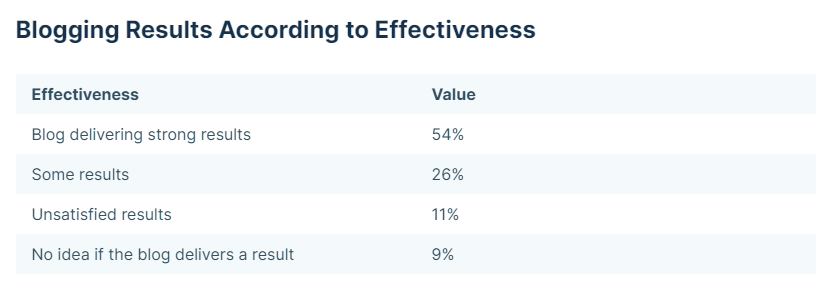
Image source: Techjury
For instance, let’s take a look at the fitness blog Men’s Health, which receives an impressive 42 million monthly visitors. This showcases the substantial reach and engagement that a well-established fitness blog can achieve.
In terms of profitability, a study from RankIQ highlights food blogging ideas as the most profitable niche, generating the highest median income for bloggers in this category. Food blogs dominate the categories of blogs with over 50,000 average monthly visitors when compared to other niches. Following closely behind is the personal finance niche, which is known to yield substantial earnings for bloggers.
Regarding generating high traffic levels, four niches stand out: food, lifestyle, travel, and arts/crafts. According to RankIQ, these four niches comprise 74% of all high traffic blogs.
It’s important to remember that while these statistics offer insights into the popularity and profitability of certain niches, individual blog performance may vary. Factors such as content quality, marketing strategies, and followers engagement all play a role in the success of a blog. For further statistics knowledge click.
Establish A Niche For Your Blog
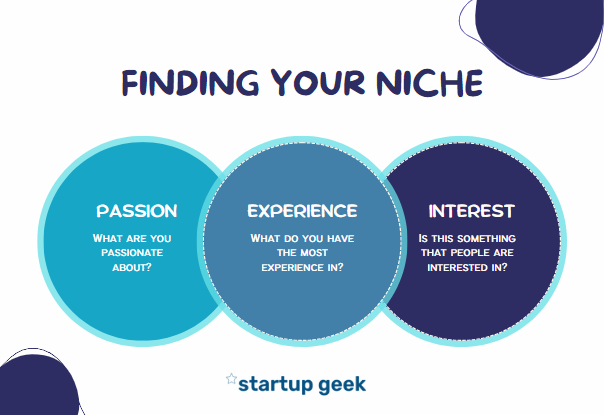
When it comes to finding your blogging niche, it’s important to consider a few key factors that can guide you in making the right choice. Let’s explore some of the many questions that will help you narrow down your options:
What Are You Passionate About?
Start by identifying your interests, hobbies, or subjects that genuinely excite you. Blogging about anything you’re passionate about will motivate you and make the writing process more enjoyable.
What Do You Have The Most Experience In?
Reflect on your expertise, skills, and knowledge. Draw upon your professional background, education, or personal experiences that can provide valuable insights and unique perspectives within a specific niche.
Is There Interest In This Niche?
While your passion and experience are essential, it’s also crucial to ensure that there is an audience interested in the niche you choose. Conduct some external research to understand if there is a demand for the topics you’re considering and the reason behind it. Look for online communities, social media pages, or forums discussing related subjects to gauge the level of interest.
By asking yourself these questions, you can narrow down your options and find a niche that aligns with your passions and expertise and has an audience eager for the content story you’ll provide. Remember, balancing your interests and the audience’s demand is key to building a successful blog.
The Role Of Keyword Research In Blogging Success And Profitability
Conducting thorough keyword research is essential to assess the potential reach and viability of a blogging niche. This helps you determine whether there is sufficient interest in the niche’s topics to build a successful blog.
By analyzing keywords, search volumes, related terms, and competition, you gain valuable insights into the size of the target audience actively seeking content within your chosen niche. This information helps you gauge the level of interest and the potential traffic you can attract to your blog.
Additionally, keyword research helps understand search intent for monetization opportunities through avenues like advertisements, sponsored content, or implementing a paywall. If a niche lacks interest or monetization potential, explore alternatives. Passion and expertise are important, but sustained dedication requires an engaged audience and financial returns..
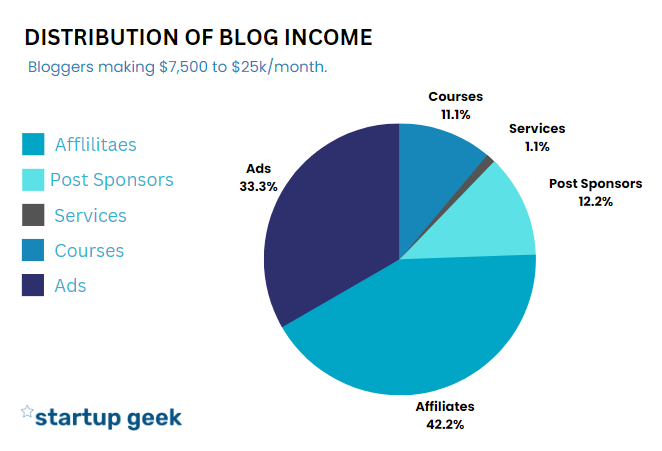
There are many options out there to conduct keyword research, one option is Google search operators, as they are special characters and commands (sometimes called “advanced operators”) that extend the capabilities of regular text searches. Search operators can be useful for everything from content research to technical SEO audits. Here are some examples:
- “”: Quotation marks are used to search for an exact phrase or set of words in a specific order, without any change. For example, “openai chatbot” will only find pages where these words appear together in this exact order.
- -: The minus sign excludes a word or phrase from the search results. For example, a jaguar-car would return results about jaguars (the animal) but not jaguars (the car).
- site:: The site: operator searches within a specific website. For example, site:openai.com would only return results from openai.com.
6 Tricks To Make Your Blog Stand Out
Now, get ready for some more exciting advice! I’m about to share six powerful tips that will make your blog truly unique in the ever-crowded blogosphere of 2023.
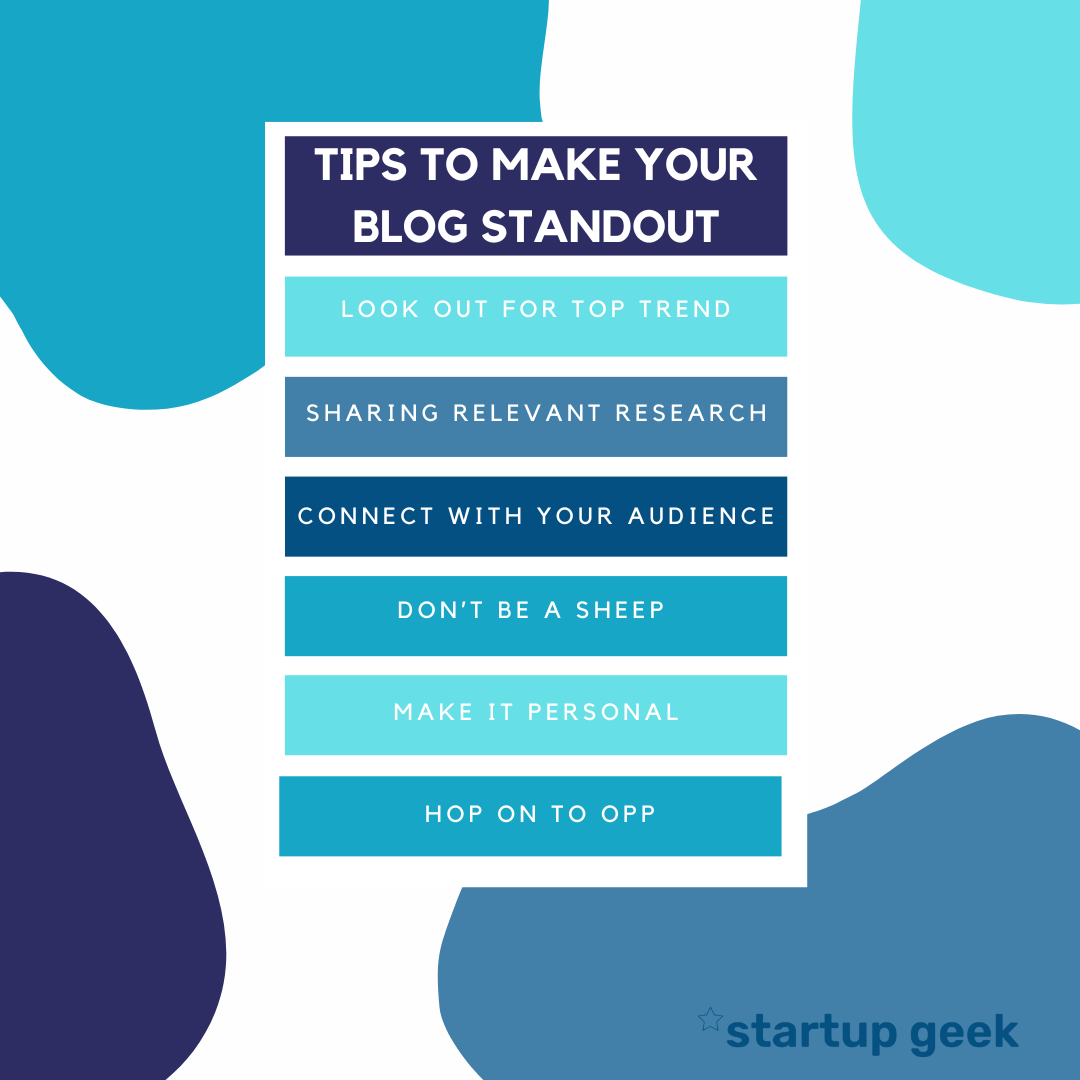
.
1. Look Out For Top Trends:
Ever wondered what truly captivates your readers? What’s the hot topic on everyone’s lips?
There’s a great little tool called Google Trends that can be your secret weapon. With just a few clicks, you can discover the trending topics that people are actively searching for and find the perfect places for your business. It’s like a goldmine of inspiration!

Source: Google Trends
One hack is to type your topic into your favorite search engine (Chrome or Safari) and observe what it suggests. These suggestions are based on the most popular searches, providing you with valuable insights into what’s buzzing in the virtual world.
2. Sharing Relevant Research:
Let’s talk about the power of sharing relevant research in your blog posts. It’s a fantastic way to solidify your arguments, establish credibility, and capture the genuine interest of your readers.
Think about it: people crave information that’s not only popular but also directly relevant to their lives. By regularly incorporating research into your posts, you’ll not only cater to their interests but also establish yourself as an authority figure they can trust. And the bonus? You’ll also boost your domain authority on Google, which is a win-win situation.
One effective approach is to create an annual summary of industry facts and statistics, just like these types of examples—one focused on Discord usage and stats or another on Intercom. These summaries are valuable resources for your readers and demonstrate your commitment to providing them with up-to-date and insightful information.
3. Connect With Your Audience
Let’s talk about the art of connecting with your audience on a deeper level.
As Michael Stelzner wisely said:
When it comes to blogging success, every seasoned blogger will stress the importance of starting with the audience. Take a moment to understand their struggles, in which part of the country they currently seek solutions, and what solutions they are actively searching for. The better you comprehend your ideal readers, the greater your chances of capturing their attention now and in the future.
Not only that, but understanding their preferences will enable you to keep them engaged on your site for longer, as they revel in your insights, advice, and solutions.
Remember, speaking directly to your audience is the key to forging a strong and lasting connection. So, get to know them intimately and let your blog thrive!
4. Don’t Be A Sheep
If you really want to make a splash and grab attention, it’s time to embrace the art of controversy. Break free from the norms, go against the grain, and say something truly unexpected.
Now, if you’re running a business, you’re probably already aware of the significance of having a unique selling proposition (USP) to make your blog stand out in a fiercely competitive marketplace.

Source: google
But here’s the exciting part: being unique doesn’t necessarily mean you have to delve into politics or dissect Beyoncé’s latest album. You can still be genuine and authentic while sharing an original idea through a captivating title or hook.
Believe it or not, the same holds true in the world of technology and blogging. To provide you with an understanding of my point, here are a few instances of viral blog posts that were right on target. These posts are laser-focused, masterfully written, and present concepts that challenge the status quo in some way:
- Ryan Holiday’s thought-provoking piece: “Dear Entrepreneurs: Please Don’t Write a book—We’re Begging You“
- Mark Manson’s unconventional guide: “The Subtle Art of Not Giving a F— and Stop Trying to Be Happy“
- Seth Adam Smith’s eye-opening revelation: “Marriage Isn’t for You“
- Hillary Weiss’s captivating exploration: “Money + Misdirection: The Shadow Side of ‘Charge What You’re Worth’ Pricing Culture”
What makes these authors stand out? It’s their strong writing voice, profound knowledge of their respective niches, and their ability to offer readers a fresh perspective while staying true to themselves both personally and professionally.
So, dare to be controversial, embrace your unique voice, and watch your blog soar to new heights of engagement and influence.
5. Make It Personal
While a dash of controversy can sometimes work in your favor, it’s crucial to maintain truthfulness and integrity in your writing. The last thing you want is for dishonesty to come back and harm your reputation—it’s definitely not the way you want your blog to stand out!
The goal is to realize that being authentic is key, and you should never jeopardize your business by presenting an inauthentic image. In fact, why not take a step further and build trust with your audience by sharing personal information? It’s a fantastic way to establish a genuine connection.
Let me give you a prime example of 100% authentic and personal writing: Chris Guillebeau’s annual reviews. Every year, Chris fearlessly publishes an honest account of the good, the bad, and the downright ugly aspects of his journey towards achieving his annual goals. This level of transparency and vulnerability not only resonates with readers but also strengthens the trust they have in him.
Share personal stories, experiences, and insights that genuinely connect with your audience. By doing so, you’ll build an unwavering bond and set your blog apart in a truly authentic way.
6. Hop On To OPP (Other People’s Platforms)
One effective approach is to invite readers from other blogs to contribute guest posts on yours. By opening up your platform to talented guest writers, you not only offer fresh perspectives and diverse voices to your audience but also tap into their existing communities. This helps you expand your reach and attract new readers who are already interested in the guest author’s content.
Think about it as a win-win situation. The guest writer gets exposure to your audience, and you benefit from their expertise and the influx of new readers. Plus, it adds a refreshing variety to your blog’s content, making it even more enticing for your regular readers.
To enhance your blog’s reach, leveraging social media platforms is a powerful strategy. Sharing your blog posts on platforms like Facebook, Twitter, Instagram, LinkedIn, and TikTok allows you to tap into diverse communities and attract new followers.
Social media provides a platform for readers to share your posts with their networks, potentially leading to viral exposure and increased readership. Encouraging social sharing and interaction can transform your audience into brand advocates who actively promote your blog.
Here Are Some Statistics Related To Other People’s Platforms (OPP):
- Facebook: As of 2023, Facebook has over 2.8 billion monthly active users, making it one of the most popular OPPs. The average user spends about 38 minutes per day on the platform. –Statista
- Instagram: Instagram, another popular OPP, has over 1 billion monthly active users. 63% of Instagram users log in at least once per day. –Statista
- Twitter: Twitter has approximately 330 million monthly active users as of 2023. On average, each Twitter user follows five businesses, and an impressive 80% of them have mentioned a brand in their tweets. –Statista
- LinkedIn: LinkedIn, a professional networking OPP, has over 774 million users in more than 200 countries and territories worldwide. –LinkedIn
- TikTok: TikTok, a rapidly growing OPP, has over 1 billion monthly active users. The average user spends about 52 minutes per day on the platform. –Wallaroo
- YouTube: YouTube, the world’s largest video-sharing platform, has over 2 billion logged-in monthly active users. On average, viewers spend over 40 minutes per viewing session.
So, embrace the power of collaboration and consider reaching out to bloggers in your niche or related fields to explore guest posting opportunities. It’s an effective way to make your blog stand out by leveraging the strengths of other people’s platforms while fostering valuable connections and expanding your reach.
Starting A Blog As Per Your Niche:
For beginners starting a niche blog involves several key steps. Here’s a simplified guide to get you started:
- Choose a blog website template: Select a software that provides a template that aligns with your blog niche, reflects your desired tone and style, and provides everything in the functionality you need.
- Register a memorable domain name: Choose a domain name that is easy to remember and represents your blog effectively. Make sure it’s unique and aligns with your niche.
- Learn to write compelling blog posts: polish your writing skill to create engaging content that showcases your expertise and builds authority. Optimize your posts for search engines to increase organic visibility. You can also explore blog post templates for inspiration and structure.
- Maintain website performance and security: Ensure your blog performs well by optimizing loading times, mobile responsiveness, and user experience. Implement strong security measures to protect your blog and keep your content accessible to readers. Following are the tools you can use: Google PageSpeed Insights, GTmetrix, Google Mobile-Friendly Test, etc.
- Promote your blog: Take proactive steps to promote your blog and reach a wider audience. Utilize social media, guest posting opportunities, email marketing, and SEO strategies to increase visibility and attract readers to your niche content.
Why Is Blogging Essential For Startups?

Source: google
Blogging is a crucial tool for startups, helping them overcome the challenge of building a customer base. While securing funding may be easier, establishing a loyal clientele can be challenging. Startups often spend months navigating marketing strategies and lead generation. Blogging provides a solution by engaging with the audience without being excessively sales-oriented.
Blogging is essential for startups for several reasons:
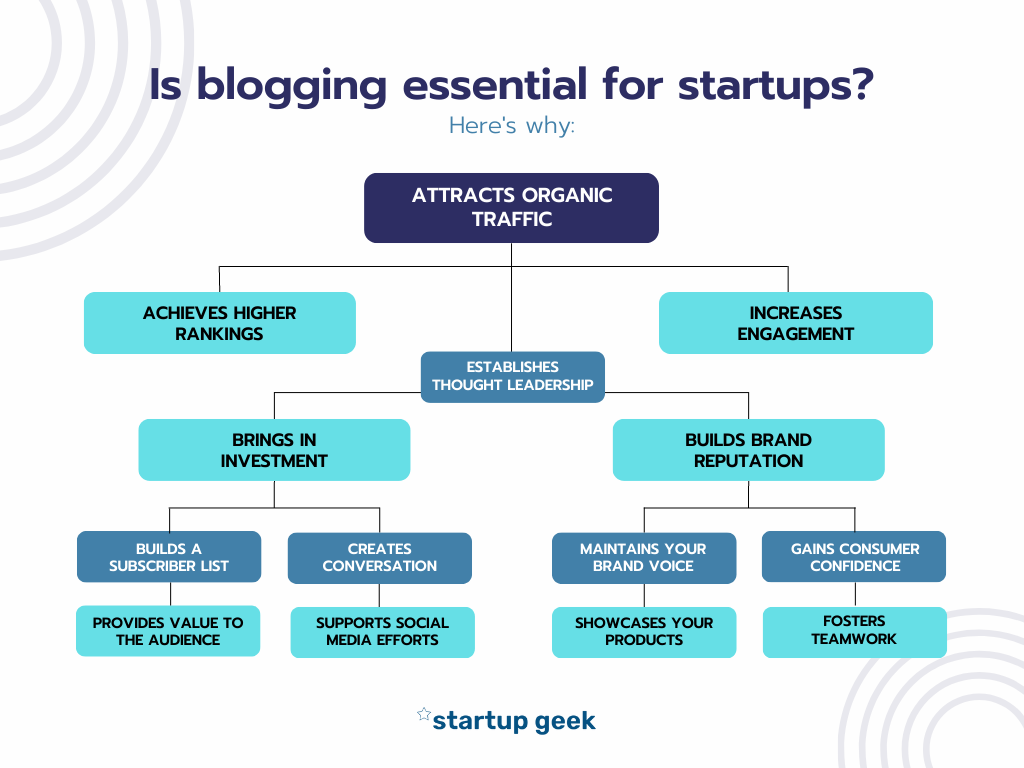
Attracts Organic Traffic:
Blogging is a powerful tool for driving organic traffic to your website, as it offers valuable content tailored to the needs and interests of your target audience. This increases your visibility and chances of attracting potential customers.
Achieves Higher Ranking:
Consistently publishing high-quality blog posts with relevant keywords can improve your search engine rankings, making it easier for potential customers to find your startup.
Increases Engagement:
Engaging blog content encourages readers to interact with your brand, leaving comments, sharing posts, using tags, and starting conversations. This boosts engagement and creates a sense of community around your startup.
Establishes Thought Leadership:
Through blogging, you can demonstrate your expertise and establish yourself as a thought leader in your industry. This builds trust and credibility among your audience.
Brings In Investment:
Blogging can attract the attention of potential investors to cater the budget, showcasing your startup’s vision, expertise, and market knowledge. It can serve as a powerful tool to attract funding and support. Furthermore, blogging can also be utilized to share valuable industry insights, tips, and even recipes that highlight your startup’s unique expertise.
Image Source: Rankiq
Builds Brand Reputation:
Regularly publishing informative and valuable blog content helps build a positive brand reputation. It shows your commitment to providing value and expertise to your audience.
Builds A Subscriber List:
Through your blog, you can capture leads and build a subscriber list. This allows you to nurture relationships with your audience, convert them into customers, and retain their loyalty.
Creates Conversation:
Blogging provides a platform for conversation and engagement with your audience. It allows you to address their questions, concerns, and feedback, fostering a deeper connection and understanding. Additionally, blogging enables you to create a series of content, where you can delve into specific topics, explore them in detail, and offer your audience a comprehensive resource.
Provides Value To The Audience:
By sharing insightful and educational content, you provide value to your audience beyond just promoting your product or service. This helps build trust and loyalty.
Supports Social Media Efforts:
Blogging provides content to share on your social media channels (Instagram, Youtube, facebook), driving traffic back to your website and expanding your reach.
Maintains Your Brand Voice:
Blogging allows you to consistently communicate your brand’s voice, values, and personality, strengthening your brand identity.
Showcases Your Products:
Blogs provide an opportunity to highlight and showcase your products or services in a more informative and engaging manner.
Gains Consumer Confidence:
By providing useful and relevant information through your blog, you gain the confidence of your target audience, making them more likely to choose your startup over competitors.
Fosters Teamwork:
Blogging can be a collaborative effort within your startup, involving team members in content creation and promoting a sense of unity and shared goals.
60+ Startup Blog Post Ideas
In the fast-paced world of startups, a compelling blog can be a powerful asset to engage your audience and drive growth. Our handpicked collection covers a diverse range of topics, from practical tips for entrepreneurs to industry insights and success stories. Whether you’re looking to educate, entertain, or inspire your readers, these ideas will serve as a catalyst to fuel your content strategy.
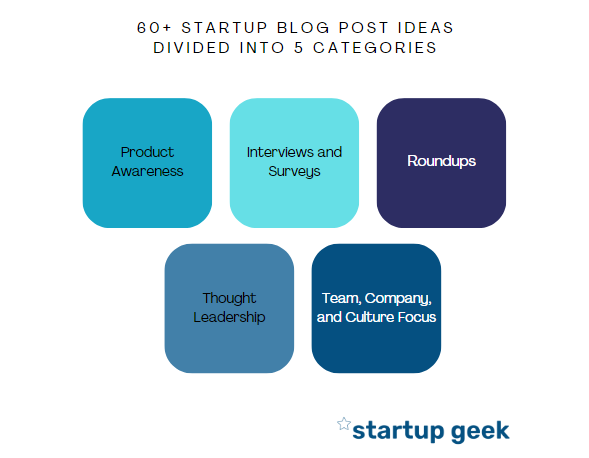
Let’s explore these exciting startup blog post ideas and embark on a journey of content excellence.
1. Product Awareness: Amplify Your Startup’s Presence With Compelling Blog Posts
If your startup is in the critical phase of launching and establishing product-market fit, creating informative blog posts can significantly contribute to your success. These posts serve as valuable resources that not only help you make a convincing case to potential customers but also establish your brand as an authority in the industry.
As your product gains traction, these blog posts will attract Google searchers, providing authoritative information that guides them into your sales funnel. If you’re considering blogging, prioritizing these topics should be at the forefront of your strategy.
Here Are Some Impactful Ideas To Include In Your Blog Content:
- Highlight lesser-known features of your product, showcasing unique functionalities.
- Explore various use cases for your product, demonstrating its versatility.
- Create comprehensive “how-to” guides for purchasing, setting up, or utilizing your product.
- Share compelling customer case studies that showcase the success stories and benefits of your product.
- Offer a list of “10 ways to solve problem X,” presenting your product as an effective solution.
- Bust common myths surrounding the problem your product addresses, showcasing its effectiveness.
- Conduct a thorough comparison between your product and your competitors, highlighting its strengths.
- Produce engaging screencasts or videos that demonstrate your product in action.
- Downloadable content will tease readers with excerpts from e-books, white papers, webinars, or other valuable resources and encourage them to download the full content.
- Address frequently asked questions about your product, providing clear and informative answers.
2. Interviews And Surveys: Unlock Valuable Insights And Engage Your Audience
Looking for ways to generate compelling blog topics without the extensive writing effort? Interviews and surveys are powerful items that allow you to gather valuable data from customers, partners, and industry experts. By leveraging these insights, you can create engaging blog posts that resonate with your audience and attract attention from interviewees’ own networks.
Consider Incorporating The Following Course Of Strategies Into Your Blogging Approach:
- Interview customers who are using your product: Showcase real-life success stories and experiences, highlighting the benefits and value your product brings to their lives.
- Interview industry specialists: Tap into the knowledge and expertise of influential figures in your industry. Their insights and perspectives will provide unique and valuable content for your blog.
- Interview anyone who worked for a competitor: Gain insights from someone who has experienced the industry from a different perspective. This can offer valuable comparisons and insights into market trends and challenges.
- Interview professors, recent graduates, or retirees from your industry: Seek out diverse voices and perspectives to provide fresh insights and alternative viewpoints.
- Interview speakers or sponsors at conferences: Capitalize on industry events by interviewing industry leaders and experts. Their expertise and association with the conference will lend credibility to your blog.
- Conduct polls or ask questions on Twitter: Engage with your audience by soliciting their thoughts or conducting surveys. Share the results in blog posts to spark discussion and provide valuable insights.
- Conduct surveys with tools like SurveyMonkey or other online survey apps: Leverage online survey tools or apps to collect data and opinions from your community members. Analyze the results and present them in informative blog posts. Surveys are a powerful way to gather insights, understand your audience better, and create engaging content based on their preferences and feedback. By utilizing survey apps, you can streamline the data collection process and make informed decisions regarding the topics and content you cover in your blog.
- Gather expert tips and recommendations: Invite industry experts to provide tips and insights related to your niche. Compile their recommendations into a round-up blog post, offering a comprehensive resource for your reader.
- Feature guest posts from industry experts: Extend your reach and provide diverse perspectives by inviting industry experts to contribute guest posts. This not only enriches your blog but also allows you to tap into their networks and gain exposure.
3. Roundups: Curate Compelling Lists To Inform And Engage Your Readers
Roundup posts that feature curated lists of tools, tips, and ideas are highly shareable and easily digestible content that resonates with online readers. They allow readers to quickly skim through the post and use the curated list as a valuable resource for problem-solving. Additionally, roundup posts tend to rank well in search engine results, increasing their discoverability.
Here Are Some Roundup Ideas To Generate Engaging Content For Your Blog:
- Compile a list of popular sites in your industry: Notify these sites and encourage them to share the post, fostering collaboration and expanding your reach.
- Curate the most popular social media posts in your industry for a specific time frame (month/year/week), offering readers a snapshot of the latest trends and discussions.
- Create a list of benefits for a specific action, highlighting the advantages and motivating readers to take action.
- Develop a list of things to avoid, providing valuable insights and helping readers navigate potential pitfalls.
- Find useful tips from other content sources, compile them into a list, and include links to the original articles as sources, offering readers a curated collection of actionable advice.
- Share key takeaways from conferences or industry events, providing readers with a valuable summary and showcasing your expertise.
- Curate top motivational YouTube videos, e-books, webinars, infographics, or images that resonate with your audience, creating a go-to resource for inspiration and education.
- Collect noteworthy tweets from webinars or conferences using a specific hashtag, offering your own takeaways and insights in the blog post.
- Create a list of trends to watch in your industry, providing readers with valuable foresight and positioning your blog as a reliable source of industry insights.
- Develop a list of complementary products or services that align well with your own offering, helping the readers discover the answer to enhance their experience.
- Compile a list of influential social media accounts that people in your industry should follow, offering a curated selection of valuable resources for your readers.
4. Thought Leadership: Establish Your Startup As Industry Expert And Thought Leader
Positioning your startup’s founders as important leaders in your industry is a powerful strategy to build your brand and showcase your expertise. Thought leadership content helps you establish credibility and gain the trust of your audience. Whether you write the content yourself or work with a ghostwriter, it is essential for your leadership team to engage in thought leadership activities as you launch your blog.
Here Are Some Ideas To Demonstrate Thought Leadership In Your Blog:
- Take a stand on a controversial issue within your industry, providing well-reasoned arguments and insights that challenge the status quo.
- Make predictions about your industry’s future, demonstrating your forward-thinking mind and ability to anticipate trends and developments.
- Offer commentary on industry trends, providing insightful analysis and perspectives that help readers understand the evolving landscape.
- Conduct side-by-side comparisons of complementary companies or services, offering an objective evaluation that assists readers in making informed decisions.
- Review books relevant to your industry that you believe your customers should read, sharing valuable takeaways and recommendations.
- Identify common mistakes in your industry and provide practical solutions on how to fix or avoid them, positioning your startup as a trusted advisor.
- Relate your content to current events or celebrities, drawing meaningful lessons and insights that resonate with your family i.e. your audience.
- Take a contrarian position on an article or industry viewpoint you disagree with, providing a well-articulated counter-argument supported by evidence and examples.
- Share slides from recent presentations or speaking engagements, offering valuable insights and knowledge to a wider audience.
- Respond to industry research with your own perspective, offering a fresh angle that sparks conversation and contributes to the ongoing discourse.
- Conduct in-depth case studies about successful companies or provide examples of how other organizations have succeeded, sharing valuable insights, lessons learned, and quotes from industry experts. This not only adds credibility to your blog post but also offers readers tangible examples of strategies and approaches that have worked in real-world scenarios.
- Offer industry takeaways and analysis of breaking news events, providing your audience with timely and relevant insights.
5. Team, Company, And Culture Focus: Showcasing Your Startup’s Unique Identity
To attract top talent and showcase the essence of your startup, it’s important to create content that highlights your team, company, and culture.
Here Are Some Ideas To Engage Your Audience And Convey Your Startup’s Personality:
- Spotlight your company culture, mission, or core values, providing an inside look at what makes your startup unique and inspiring.
- Write about “What we’re not,” sharing insights into the distinct qualities or practices that set your startup apart from others in the industry.
- Get creative by creating a music video that reflects your company’s spirit, injecting a sense of fun and energy into your content.
- Conduct interviews with each team member, delving into their individual career journeys and experiences, showcasing the diversity and expertise within your organization.
- Share photos from recent events or conferences, allowing readers to glimpse the vibrant moments and networking opportunities your team has embraced.
- Post screenshots from virtual events, capturing the dynamic and interactive nature of your online engagements.
- Provide a behind-the-scenes glimpse into your startup through videos or photos, showing the everyday activities and personalities that drive your success.
- Celebrate team members’ promotions, sharing their stories of success and highlighting the qualities that contributed to their growth within the organization.
- Write posts that capture the spirit of the current season or holiday, demonstrating your startup’s adaptability and ability to connect with your audience in a timely manner.
- Summarize the year that was, reflecting on key achievements, milestones, and challenges your startup has faced, providing a comprehensive overview of your progress.
- If you’re seeking the kind of expert writers to generate high-quality content for your startup’s blog, consider exploring the services offered by Draft.dev. Their focus on technical content written by subject matter experts ensures you receive industry-leading knowledge without distracting your engineers.
Tips And Suggestions From Experienced Bloggers To Young Bloggers
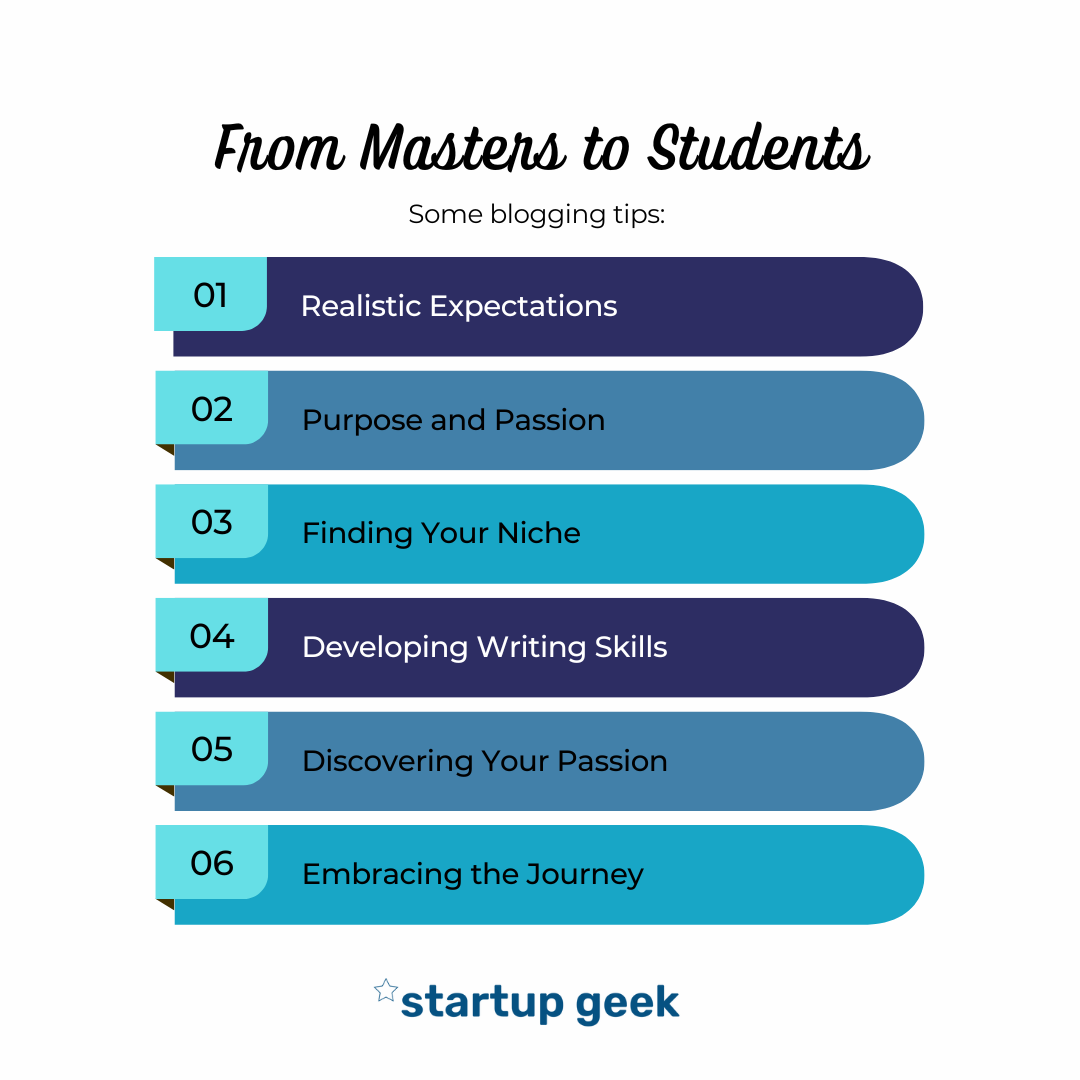
Realistic Expectations:
It’s important to have realistic expectations about blogging. Most blogs don’t make significant money, and those that do often take years of hard work to monetize effectively. Building a successful blog requires dedication, time, and perseverance.
Purpose And Passion:
There are two valid reasons to start a blog. First, if you have another business blogging can help promote it. Second, if you genuinely enjoy blogging and have a passion for it. Outside of these reasons, starting a blog might not be justified.
Finding Your Niche:
Plenty of successful bloggers may not be exceptional writers. While good writing skills can enhance your chances of success, it’s not the sole determining factor. Blogging success often comes from finding a niche market and solving problems for your audience effectively.
Developing Writing Skills:
Writing well takes time and conscious effort to develop. If you have already honed your writing skills, you may not necessarily need a blog. However, excellent writing will always be valued and appreciated, and it can contribute to the success of your blog.
Discovering Your Passion:
Writing extensively on a particular topic helps you discover your true passion and whether readers resonate with your content. It takes time and experimentation to find your unique style, voice, and topics that genuinely interest both you and your audience.
Embracing The Journey:
Blogging involves a public process of experimentation, refinement, and growth. It can be awkward and occasionally embarrassing, but it’s crucial to embrace it. Be prepared for public scrutiny, occasional hate emails, and the occasional feeling of publishing something cringe-worthy.
Some FAQs With Examples:
FAQ: Does Anyone Still Read Blogs?
Yes, people still read blogs. In fact, 77% of internet users are active blog readers.
FAQ: How Can Blogging Help My Startup Gain Visibility And Attract Customers?
Blogging helps startups gain visibility and attract customers by establishing expertise and credibility in their industry through case studies, success stories, and thought leadership.
FAQ: How Can I Monetize My Startup Blog?
You can monetize your startup blog using:
1. Affiliate Marketing:
Recommend products or services related to your startup’s niche and earn a commission for each sale made through your referral links. For instance, a beauty startup blog could review and promote skincare products, including affiliate links to purchase them.
2. Sponsored Content:
Collaborate with relevant brands or businesses to create sponsored blog posts or product reviews. For example, a food delivery startup could partner with local restaurants and write sponsored posts about their menu offerings and delivery services.
3. Online Courses Or E-Books:
Share your expertise by creating and selling online courses or e-books. For instance, a financial planning startup could offer an ebook on “Mastering Personal Finance: A Guide to Building Wealth and Financial Freedom.”
Conclusion
In the ever-evolving world of blogging, trends and techniques can change rapidly. What’s popular today may fade tomorrow. Embracing this excitement and unpredictability is part of the journey as a blogger. As you navigate through different topics, techniques, and tactics, you’ll encounter challenges, gain traffic, and continue to grow.
The topics, techniques, and tactics discussed above have a proven track record of success, positioning you as a popular and influential blogger. While you may already have a satisfactory level of traffic and audience engagement, there’s always room for improvement. Trying out some of these strategies can potentially enhance your blog’s performance and reach.
Remember, blogging is a continuous process of learning and experimentation. Stay open to new ideas, adapt to changing trends, and remain dedicated to providing valuable content to your readers. Embrace the excitement and possibilities that blogging brings, and who knows, you might just become the world’s most popular blogger.
